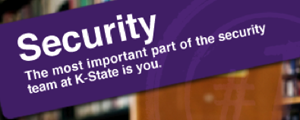Everyone at one time or another has received spam e-mails promising high-paying jobs for part-time work at home. Unfortunately, at least three K-State students responded to such offers recently and almost became victims of fraud. The offer was simple and enticing:
Work from school/home and earn $300 weekly… each days job takes maximum of 50mins… you are not working every day, only when necessary… kindly get back to us ASAP if you care to know more about the job offer.
When the students responded, they were asked to provide their name, address, phone number, age, and gender. They then received in postal mail a check for nearly $2,000 and were instructed to cash it at their bank, keep $180 for themselves to cover “internet connectivity for the first month of your job” and send the rest to their “material supplier in Michigan.” Yeah, right. One student became suspicious before it got to this point and reported it. Two others tried to cash the bogus checks which were fortunately caught by alert Manhattan bank tellers and reported to the police.
